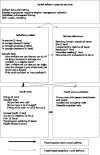The effectiveness and cost effectiveness of a national lay-led self care support programme for patients with long-term conditions: a pragmatic randomised controlled trial
- PMID: 17325405
- PMCID: PMC2652924
- DOI: 10.1136/jech.2006.053538
The effectiveness and cost effectiveness of a national lay-led self care support programme for patients with long-term conditions: a pragmatic randomised controlled trial
Abstract
Objective: Supporting patients' self care could have a major effect on the management of long-term conditions, which has led to worldwide interest in effective self care interventions. In England, self care support is being developed through the "Expert Patients Programme", which provides lay-led generic courses to improve patients' self care skills. However, the clinical and cost effectiveness of such courses remains unclear.
Methods: Two-arm pragmatic randomised controlled trial design with waiting list control in community settings in England. 629 patients with a wide range of self-defined long-term conditions were studied. The lay-led self care support group involved 6-weekly sessions to teach self care skills. Primary outcomes were self-efficacy, reported energy and routine health services utilisation at 6 months. A cost-effectiveness analysis was also conducted.
Results: Patients receiving immediate course access reported considerably greater self-efficacy and energy at 6-month follow-up, but reported no statistically significant reductions in routine health services utilisation over the same time period. The cost-effectiveness analysis showed that patients receiving immediate course access reported considerably greater health related quality of life, and a small reduction in costs. If a quality adjusted life year was valued at 20,000 pounds (39,191 dollars; 30,282 Euro), there was a 70% probability that the intervention was cost effective.
Conclusions: Lay-led self care support groups are effective in improving self-efficacy and energy levels among patients with long-term conditions, and are likely to be cost effective over 6 months at conventional values of a decision-maker's willingness to pay. They may be a useful addition to current services in the management of long-term conditions.
Conflict of interest statement
Competing interests: None.
References
-
- Murray C, Lopez A.The global burden of disease: a comprehensive assessment of mortality and disability from disease, injuries and risk factors in 1990. Boston: Harvard School of Public Health on behalf of the World Bank, 1996
-
- Wagner E, Austin B, Von Korff M. Organizing care for patients with chronic illness. Milbank Q 199674511–543. - PubMed
-
- Department of Health Self care—a real choice: self care support—a practical option. London: Department of Health, 2005
Publication types
MeSH terms
LinkOut - more resources
Full Text Sources
Medical


